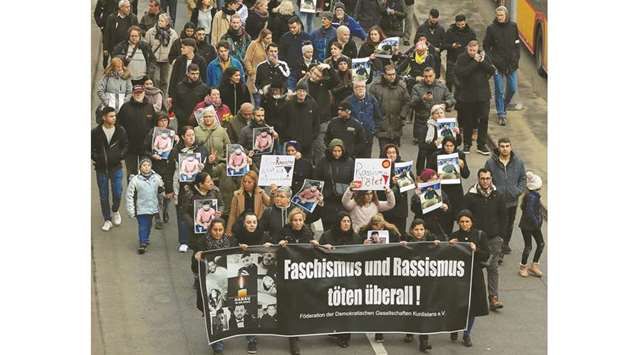The deadly shooting spree in the western town of Hanau this week was a terrorist attack with racist motivation, German Interior Minister Horst Seehofer said yesterday, as he announced a greater police presence across Germany.
Mosques and other “sensitive sites” will be monitored more closely, while federal police will be present at railway stations, airports and at the country’s borders, according to the minister.
But German laws will not be tightened.
Late on Wednesday, a 43-year-old German national – identified only as Tobias R under Germany’s strict privacy laws – allegedly shot dead nine people in the centre of Hanau.
Three of the victims had German nationality, two Turkish, one Bulgarian and one Romanian, according to the criminal police office of the state of Hesse.
One person stemmed from Bosnia and one victim was a dual German and Afghan national.
The injured include two German nationals, two Turkish nationals and one person with both German and Afghan citizenship.
The alleged shooter also killed himself and his 72-year-old mother.
It remains unclear when exactly his mother was shot dead.
Tobias R had expressed woolly thoughts, abstruse conspiracy theories and racist views online.
During his shooting spree, he targeted two shisha bars and a kiosk, allegedly seeking out people who appeared to be foreign.
Two of the victims were shot in their cars as Tobias R drove through Hanau, authorities told lawmakers yesterday, according to participants in the conference call.
They were told that Tobias R had been unemployed recently, had few social contacts and lived with his parents.
Two weapons were found at their home.
People in Hanau were planning to express their sympathy with the victims and protest against right-wing extremism at rallies and vigils.
More events are also planned for the weekend.
“Danger from right-wing extremism, anti-Semitism and racism is very high in Germany,” Seehofer said, noting that it was the “third right-wing terrorist attack in just a few months”.
He highlighted measures taken by the authorities in recent days, including searches of homes of known extremists, where they secured “explosives and hand grenades in large numbers, as well as automatic weapons”.
The searches had forestalled further attacks, Seehofer said.
Investigators believe that Tobias R was mentally ill.
The head of the Federal Criminal Police Office, Holger Muench, spoke of an apparently “serious psychotic illness”.
“The racist motivation for this crime is, in my view, incontestable and cannot be relativised by anything,” Seehofer also stressed.
Federal Prosecutor Peter Frank said the suspect had made contact with German prosecutors in November, attempting to lay a criminal charge against an unidentified intelligence organisation.
In it, Tobias R alleged that a large and powerful organisation was “infiltrating people’s brains to seize certain things in order to control the affairs of the world”, Frank said.
No investigation was launched at the time.
Police investigators were now looking into the suspect’s mobile phone and computer data to ascertain whether he had been in contact with anyone else, whether in Germany or abroad, and where he had spent time, according to the prosecutor.
Some 40 witnesses had been interviewed in order to clear up the precise course of events on Wednesday.
There have been no indications so far of any accomplices or supporters.
The suspect’s father was known to authorities, in part due to complaint letters.
He saw Tobias R on the night of the shooting spree but is considered a witness, not a suspect, Frank said.
The political consequences to be drawn from the killing are also being discussed in Germany.
Justice Minister Christine Lambrecht said recently strengthened provisions on possession of firearms would be looked into again to see whether they were being implemented.
They require the licensing authorities to conduct a check with the intelligence services.
The Social Democrats (SPD), the junior partner in Germany’s ruling coalition, called outright for the far-right anti-immigrant Alternative for Germany (AfD) – currently the largest opposition party in parliament – to be monitored by the intelligence agencies.
“Someone opened fire in Hanau – that’s how it appears – but there were many others who provided ammunition to him, and the AfD is definitely part of that,” SPD secretary-general Lars Klingbeil told a national public television broadcaster.
Prominent Green politician Cem Ozdemir described the AfD as “the political arm of hatred” in comments broadcast on national public radio.
“The hatred sown by the AfD is the ideological precursor to right-wing terrorism,” fellow Green politician Michael Kellner added in comments to the online news portal t-online.de.
But the leader of the AfD in the national parliament, Alexander Gauland, rejected calls for surveillance, saying that seeking to exploit the crimes in Hanau for political gain was “underhanded”.
He also rejected suggestions that his party bore any responsibility for the shooting spree, describing the alleged assailant as psychologically deranged.

People take part in a march following a vigil outside a shisha cafe in Hanau, two days after a gunman killed nine in a racist attack. The words on the lead banner reads ‘Fascism and racism kill everywhere’.
